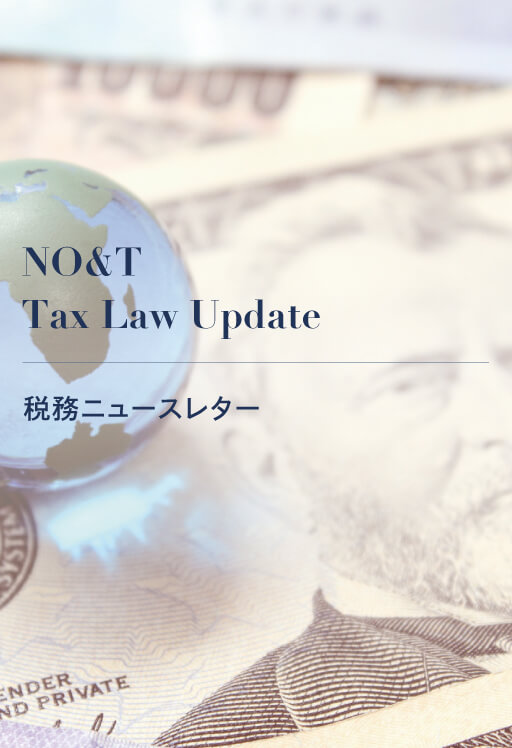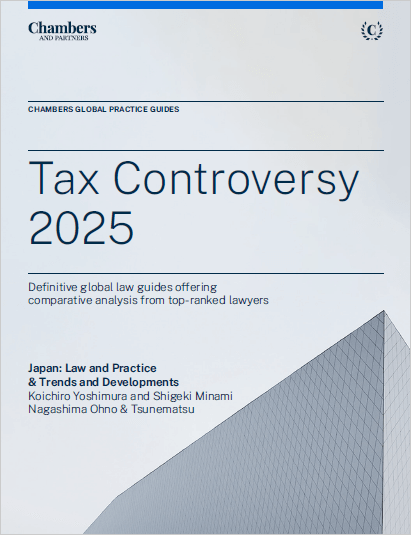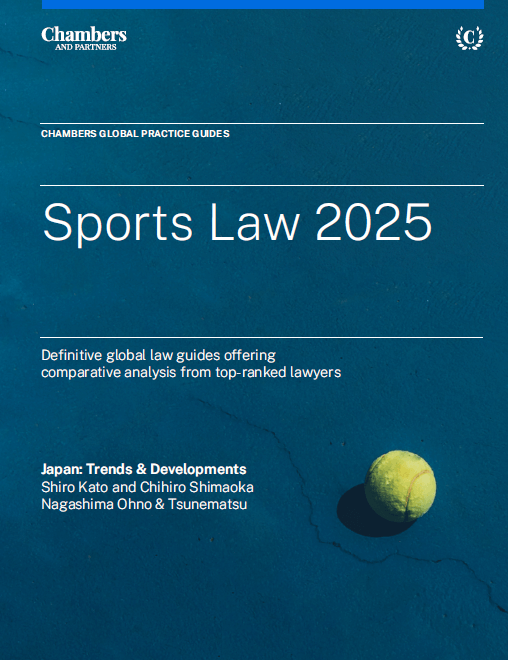
NO&T Tax Law Update
This article is also available in Japanese.
Featured Topics
Sports Business Legal Front in Japan
In Japan, the sports industry is experiencing rapid growth. While baseball (NPB) and soccer (J League) have traditionally been the most popular sports in Japan, the professional league of basketball (B.LEAGUE) is also gaining traction, and it has been announced that a new league of volleyball (SV League) will be established and is planned to become a professional league in the near future. This expansion is attracting top international talent from around the globe. For professional athletes, their agents and advisors, understanding Japan’s tax systems, including their potential pitfalls, is crucial for navigating their careers. The complexity of tax regulations, especially concerning international taxation, potentially causes many tax issues that could significantly impact their financial positions. Recently, a news report highlighted that some foreign soccer players※1 had different views on their tax residency from that of the Japanese tax authority, which led to substantial reassessments imposing additional tax liabilities※2. This newsletter outlines the Japanese tax systems applied to foreign athletes playing in Japan, especially focusing on tax treatment of remuneration paid by the club to such athletes.
For foreign professional athletes moving to Japan, and those already living/working in the county, the most relevant taxes are income tax and consumption tax. With regard to income tax, if the athlete is a non-resident of Japan for the purpose of Japanese tax law, he or she is subject to income tax in Japan only with respect to domestic source income as enumerated in the Income Tax Act. In addition, in principle, income tax is imposed by way of tax withholding and he or she is not obliged to file an income tax return. On the other hand, if the athlete is a resident of Japan for the purpose of Japanese tax law, he or she is subject to income tax in Japan with respect to worldwide income. However, if he or she is considered a non-permanent resident※3, the scope of income taxation is limited to domestic source income and other income paid in or remitted to Japan. Further, in principle, the athlete must file an income tax return with the competent local tax office every year.
With regard to consumption tax, if an athlete is considered as an employee under the employment contract with the club, basically, he or she is not subject to consumption tax, while, if he or she is considered as a sole proprietor, he or she is subject to consumption tax. It depends on the type of sport and its typical contract practice, but, under Japanese practice, in most sports, such as baseball and soccer, professional athletes are treated as sole proprietors, and accordingly, are subject to consumption tax in Japan. If the athlete is a non-resident of Japan and the taxable sales arise from a provision of services as an entertainer or sportsperson, such taxable sales are subject to consumption tax by way of a reverse-charge mechanism. On the other hand, an athlete who is a resident of Japan is obliged to file a consumption tax return with respect to his or her taxable sales in Japan.
| Income tax | Consumption tax | ||
|---|---|---|---|
| Non-Resident |
Scope of Taxable Income: Domestic source income Taxation Method: Tax withholding |
|
|
| Resident | Non-Permanent Resident |
Scope of Taxable Income: Domestic source income + foreign source income paid in or remitted to Japan Taxation Method: Filing tax return |
|
| Others |
Scope of Taxable income: Worldwide Income Taxation Method: Filing tax return |
||
As is shown in 2. above, tax residency is an essential issue for the tax treatment of foreign athletes. For the determination of tax residency, some countries adopt simple and clear criteria using the number of days present in the country (e.g., so called “183-day rule”), but, Japanese tax law does not adopt such approach. Instead, under Japanese tax law, a person is considered as a resident of Japan if he or she is domiciled or resides continuously for one year or more in Japan. Whether or not a person is domiciled in Japan is determined based on all the relevant facts and circumstances. The main factors for such determination are, according to former judicial decisions, the number of days present, the location of their home, their occupation, the location of their family and the location of their assets.
In this respect, for foreseeability, the National Tax Agency of Japan published a Q&A with respect to tax residency of foreign professional athletes. Following is an outline of the Q&A.
Question: I do not have Japanese citizenship. I, as a professional athlete, execute a contract with a Japanese club and move to and play in Japan. (i) The period of my contract is 11 months, (ii) my family will not move with me, and (iii) I will vacate my residence/domicile in Japan and return to my home country after the season has finished. Am I considered as a resident or non-resident of Japan for income tax purposes?
Answer: Based on the above facts, generally, since the athlete is not considered to be domiciled or to reside continuously for one year or more in Japan, he or she is treated as a non-resident of Japan. However, the athlete may be considered as a resident of Japan (a) if the period of the contract is considered to be substantially more than one year, (b) the athlete is considered to substantially bring his or her family to Japan (e.g., his or her family stays in Japan for almost all of the season or his or her family goes to school in Japan), or (c) if the athlete leaves his or her belongings at his or her residence/domicile, or places such belongings in the care of domestic business operator, when he or she goes back to their home country after the season has finished.
If the athlete plays in Japan only for one year, it is relatively clear that he or she is considered to be a non-resident of Japan for the purpose of Japanese tax law. However, if it is more than one year, the tax residency issue must be carefully examined.
Such uncertainty causes a tax risk that the athlete originally takes the position that he or she is a resident of his or her home country and a non-resident of Japan, but, the Japanese tax authority later reassesses his or her income tax liability by arguing that he or she is a resident of Japan. In such case, as a result, the athlete is treated as a resident in both his or her home country and Japan, and accordingly, subject to double resident taxation※4. In order to avoid such scenario, tax residency must be carefully examined.
In the following, we will focus on the difference in tax treatment of remuneration received from a Japanese club by a foreign athlete who is a non-resident (in 4.) and a resident (in 5.).
The remuneration paid by a club to a non-resident foreign professional athlete falls under domestic source income, and therefore, is subject to income tax by way of tax withholding, the tax rate on which is 20.42%. The withholding tax is the final tax and the athlete is not obliged to file an income tax return separately. Such taxation is basically not exempted by tax treaty because most of the tax treaties concluded by Japan allocate the taxing right to Japan as the source country with respect to income earned by entertainers and sportspersons in Japan.
In principle, remuneration paid to non-resident foreign athletes is subject to consumption tax at the rate of 10% by way of a reverse-charge mechanism, under which the club rather than the athlete is liable for the consumption tax on the remuneration. Such amount is, at the same time, deductible as an input consumption tax in the consumption tax filing of the club. Therefore, the athlete is not liable for the consumption tax in relation to his or her remuneration.
Remuneration paid to resident foreign athletes is subject to income tax at progressive rates. The maximum rate, including special income tax for reconstruction and inhabitant tax, is set at 55.945%. In principle, the athlete is obliged to file an income tax return with the competent local tax office by March 15 of the following year. In addition, with respect to certain types of sports such as baseball and soccer, income tax is withheld by the club from the remunerations paid to the athlete at the rate of 10.21%※5, but, such tax withheld is creditable against the income tax amount in the final tax return.
The following table shows the tax rate applicable based on taxable income:
| Taxable income | Tax rate |
|---|---|
| JPY 1,000 to 1,949,000 | 15.105% |
| JPY 1,950,000 to 3,299,000 | 20.21% |
| JPY 3,300,000 to 6,949,000 | 30.42% |
| JPY 6,950,000 to 8,999,000 | 33.483% |
| JPY 9,000,000 to 17,999,000 | 43.693% |
| JPY 18,000,000 to 39,999,000 | 50.84% |
| JPY 40,000,000 over | 55.945% |
If the resident foreign athlete is considered as a sole proprietor rather than an employee, the remuneration paid to the athlete is subject to consumption tax at the rate of 10%. In such case, since the reverse-charge mechanism is not applicable, in principle, the athlete is obliged to file a consumption tax return with the competent local tax office by March 31 of the following year. However, if the taxable sales in the two preceding year is JPY 10 million or less, the athlete is exempted from the consumption tax liability under the exemption rule for a small business. On the other hand, in the event that the exemption rule for a small business is applicable, in principle, the club cannot deduct consumption tax on the remuneration as input consumption tax in its consumption tax return. Therefore, the club may not allow the athlete to use the exemption rule for a small business. In addition, if the taxable sales in the two preceding year is JPY 50 million or less, the athlete is entitled to deduct a fixed percentage of consumption tax as input consumption tax in his or her consumption tax return.
As explained above, the tax treatment of remuneration and other income earned by foreign professional athletes is significantly different between a foreign resident and foreign non-resident, and as such, foreign athletes may face a difficult situation in relation to the determination of the tax residency due to its uncertainty. In particular, as in the case of Andrés Iniesta, if the athlete originally treats him or her as a non-resident of Japan, and instead, a resident of his or her home country, but the Japanese tax authority later denies such position, he or she is subject to resident taxation in both countries. Therefore, it is necessary to carefully examine an athlete’s tax position in Japan by consulting with legal and tax advisors. Lastly, please note, though this newsletter does not address, that the issue of taxation of royalties with respect to image rights and fees for advertisement should not be overlooked.
*1
One of them is Andrés Iniesta, who is a former soccer player on the Spanish national team.
*3
A non-permanent resident is a resident who does not have a Japanese citizenship and has been domiciled or has resided in Japan for five years or less in the past ten years.
*4
As mentioned in 1. above, when auditing Andrés Iniesta, a famous soccer player, the Japanese tax authority treated him as a resident of Japan for the purpose of Japanese income tax. On the other hand, he was also treated as a resident of Spain for Spanish income tax purposes. As a result, he was subject to resident taxation in both countries. It has recently been reported that he is trying to mitigate the double taxation by using the mutual agreement procedure (MAP) between the Spanish and Japanese tax authorities.
*5
20.42% for the income exceeding JPY 1 million.
This newsletter is given as general information for reference purposes only and therefore does not constitute our firm’s legal advice. Any opinion stated in this newsletter is a personal view of the author(s) and not our firm’s official view. For any specific matter or legal issue, please do not rely on this newsletter but make sure to consult a legal adviser. We would be delighted to answer your questions, if any.


(May 2025)
Takashi Saida


(May 2025)
Koichiro Yoshimura


(May 2025)
Shigeki Minami


(May 2025)
Shigeki Minami (Panel Discussion)


(May 2025)
Takashi Saida


(May 2025)
Koichiro Yoshimura


(May 2025)
Shigeki Minami


(May 2025)
Shigeki Minami (Panel Discussion)


Yothin Intaraprasong, Yosuke Konno, Naruenad Charoenpakdee (Co-author)


(April 2025)
Keiji Tonomura, Akira Komatsu (Co-author)


(April 2025)
Shiro Kato, Chihiro Shimaoka (Co-author)


Tsutomu Endo


(April 2025)
Shiro Kato, Chihiro Shimaoka (Co-author)


Tsutomu Endo


(November 2024)
Masayuki Fukuda


(November 2024)
Masayuki Fukuda